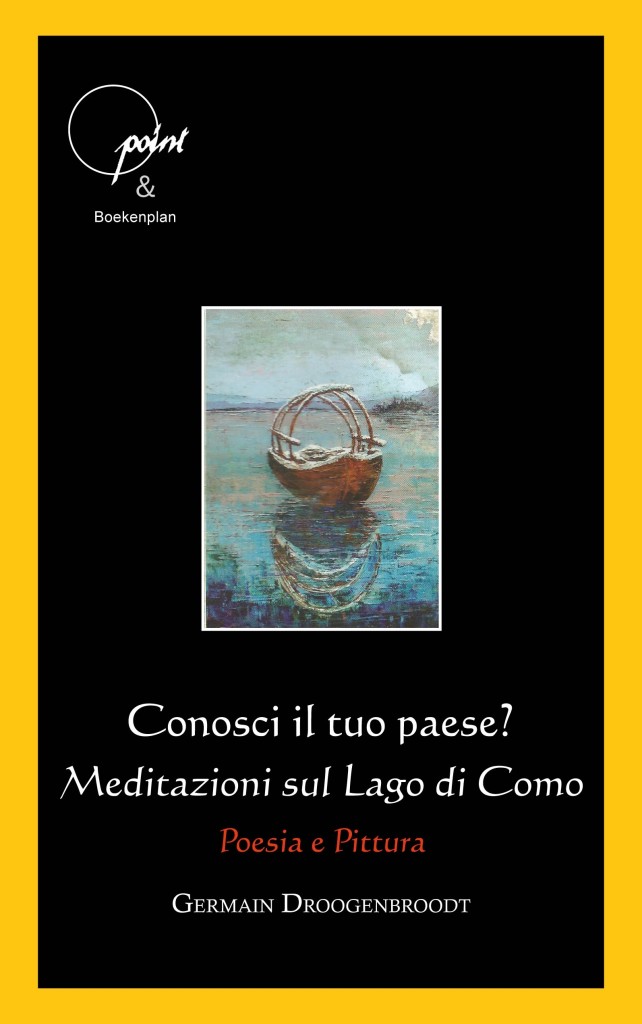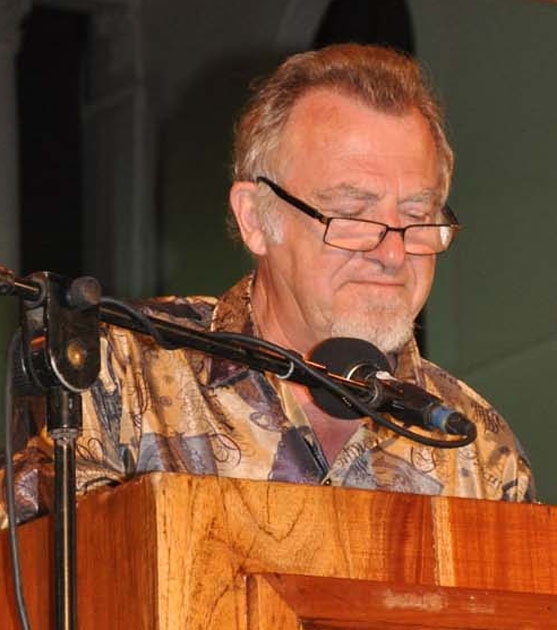(SILVIA PIO, edited by)
Born in Rollegem, in the Flemish part of Belgium, where Dutch is one of the official languages, in 1987 he moved to the Mediterranean artist village of Altea, where he still lives.
One of his books, “Do you know the country?, Meditations at Lake Como” has been translated into Italian. Lake Como is in the north of Italy and the author is a frequent guest there.
When and how did you approach poetry?
Already as a youngster I was attracted by poetry, but later, more or less at the age of 17 I moved from my home village to Brussels. There I found the best libraries: the French, the Dutch, the English and the German (Goethe Institut). I discovered “Les Fleurs du Mal” of Baudelaire, but also poetry by Verlaine, Rimbaud, Mallarmé, Lamartine, François Villon, and Victor Hugo. However, due to reasons I have not really an explanation for, I was particularly attracted by German poetry. Starting with Goethe, Schiller, Eichendorf and later Rilke, Hölderlin and the nature poets of last century such as Peter Huchel and Reiner Kunze, whose poetry I translated and published later. In fact, contrary to contemporary Flemish and Dutch poets which are generally influenced by Dutch and in a few cases by American poetry, my poetry was initially influenced by German nature poets. The poem, “Forty at the wall”, which gave the title to my first poetry book, I dedicated to the East German nature poet Peter Huchel
When and how did you start writing poetry?
I wrote some poems as a youngster, which, fortunately have been lost. Later I wrote and published in magazines several short stories, as well as book reviews and travel reports, but my debut as a poet was very late. In fact my first book of poetry, titled “Forty at the wall”, regarded as neo romantic poetry, was published in 1984 when I was 40 (to which the title of the book refers). I regarded becoming 40 as a sign, a kind of warning. I still lived in Belgium at that time. However, having discovered Italy reading Goethe and intending to move to Italy, my poetry drastically changed. In Italy I wrote a book, the title of which is a verse by the great German master Goethe: Do you know the country where the lemon trees flourish? (Kennst du das Land wo die Zitronen blüh’n?). This book has been translated into Italian and has inspired a group of forty Italian artists, whose works were exhibited in the town of Erba near Como in September 2013 in an event of reading, music and dance. Something similar is going to take place next 29 March 2014.
“Do you know the country?”, contrary to the first book of rather introspective, melancholic poems, contains mainly observing, meditative nature or panoramic poems. Later, starting with The Road, written in India, my poetry would again make a dramatic change and become more philosophic, influenced by my reading of Asian poets and philosophers as well as by my countless travels through the East.
What exactly is poetry to you?
Even more than before, poetry is for me first of all an existential search. Paul Celan, one of my favourite poets wrote: «reality does not exist, reality wants to be searched for and discovered» and the great Spanish poet José Ángel Valente, a selection of whose poetry I also translated, said that poetry is not the reproduction of something the poet has previously experienced but it is producing a new experience. So this is poetry for me also: searching for and discovering what I had not discovered before, illuminating. I could not live without poetry. Secondly, it is also a creation of beauty for those readers who do not find beauty anymore in what is offered by the media and the omnipotent Big Brothers like Google & Co, which are manipulating our lives.
Germain Droogenbroodt is an internationally appreciated poet, translator, publisher and promoter of modern international poetry. So far he has written eleven poetry books and translated – he speaks six languages – more than thirty collections of German, Italian, Spanish, English and French poetry.
As founder and editor of POINT Editions (POetry INTernational) he has published more than eighty collections mainly of modern, international poetry. In 1996 he set up a new poetic movement, called neo-sensacionismo with the famous Chinese poets Bei Dao and Duo Duo.
After his début with “Forty at the Wall” (1984), defined as neo-romantic poetry, he published “Do you know the country?”, Meditations at Lake Como (Italy), a collection of nature poems. In 1995 he was awarded a Hawthornden Fellowship (Scotland) where he wrote “Conversation with the Hereafter”, poems about death, awarded the P.G. Buckinx-Prize, and “Palpable Absence”, a bilingual (Dutch-Spanish) collection of love poems. At the end of 1997 “Twenty-five and Two Love Poems” appeared and in 1998 “Between the Silence of Your Lips”, his collected love poems.
During his sojourn at the Palace-Fortress Neemrana in Rajasthan he completed the poetry cycle “The Road”, a poetic bridge between the East and the West, inspiring the Flemish artist Frans Minnaert and the Indian painter Satish Gupta, who enriched “The Road” with their drawings.
In 2001 he wrote in Spanish “Amanece el Cantor” (The Singer Awakes), a homage to the late poet José Ángel Valente, followed by “Counterlight” written in Ronda (Southern Spain) in 2002.
In 2008 he published “In the Stream of Time”, Meditations in the Himalayas. “Unshadowed Light”, his latest volume of poetry, was launched at the end of 2012 in a bilingual Dutch-Spanish publication at the Book Fair in Antwerp and in several Belgian towns and in Spain.
Germain Droogenbroodt is frequently invited to give readings and conferences at universities and international poetry festivals all over the globe. He has been honoured with a Doctor of Literature, h.c. in Egypt in 1990 and awarded several prizes.
Germain has a column in Margutte called Parade of Poems.



